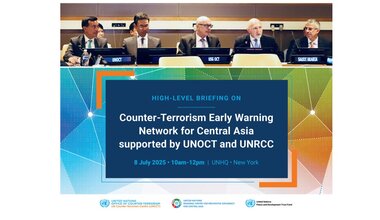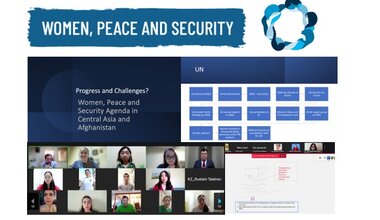Secretary-General’s remarks at “Taza Koom” Conference on Public Service [as delivered]
Bishkek, Kyrgyzstan, 11 June 2017
Your Excellency Mr. Almazbek Atambaev, President of Kyrgyzstan,
Ladies and Gentlemen, dear friends,
I want first of all to express my deep gratitude to President Atambaev for his gentle invitation that allowed me to come back to Kyrgyzstan. I have to say that it is for me an enormous honour, and of course an enormous pleasure.
In more than 10 years, the exemplary cooperation with the Government and people of Kyrgyzstan in my past capacity as United Nations High Commissioner for Refugees, I witnessed how in very difficult circumstances sometimes, the people of Kyrgyzstan have made a deliberate choice for democracy, a deliberate choice for a regime based on the rule of law, the protection of human rights,, with a vibrant civil society, making Kyrgyzstan the pioneer of democracy in Central Asia.
Now, with Taza Koom, you are not only the pioneer of democracy in Central Asia, but you are becoming also a pioneer in the build-up not only of a digital economy but of a digital environment. And that is something extremely important in today’s world.
That is why it is an honour for me to address this important Conference on the national Taza Koom project – a project on digital technologies and e-governance to improve not only the way the State and the administration work, but also the way the people can benefit from the new technologies and the impact on their lives.
This is also a way to allow Kyrgyzstan to be more effective in the implementation of the Sustainable Development Goals and to extend then the benefits to all citizens.
The first decade of the 21st century showed that setting development goals at the international level can bring great benefits to humanity. The Millennium Development Goals were instrumental in mobilizing international efforts to lift more than one billion people out of extreme poverty, combat hunger, improve health and advance access to education, especially for girls.
But the fruits of progress have not been enjoyed by all. We still live in a world of great inequality, where destitution coexists with extreme wealth; where the environment is under severe stress; and where many countries are suffering from armed conflict and natural disasters.
And there is a new source of poverty: the digital divide, the digital inequality, that seems to draw the line between countries that have a future and countries that will be lagging behind in the decades to come.
Now, two years ago, world leaders adopted the ambitious 2030 Agenda for Sustainable Development, with seventeen Sustainable Development Goals at its heart. The Agenda is our shared plan to transform the world in fifteen years and, crucially, to build lives of dignity for all.
But governance will be crucial in bringing the agenda to life. And an important form of governance is e-governance; and that is why “Taza Koom” is so important.
Indeed, the Goals firmly bring back to the fore the role of government and institutions in sustainable development.
But today we need another kind of governance.
We need governance that is capable of delivering results and earning the public’s trust; governance that is coherent and accountable; governance that is inclusive and that listens to all the country’s citizens; governance that upholds human rights and leaves no one behind.
This is the kind of governance that “Taza Koom” can support to strengthen.
Public service is a critical component for achieving the Sustainable Development Goals. But we need to pioneer new approaches, work differently, take risks and innovate. This means training in new skills and building the capacities of the public sector. And it means seizing the potential of technological innovations to create more responsive, efficient and collaborative public services.
We cannot talk about effective, accountable public service without underscoring, as the President said, the need to fight corruption at every turn. Again, “Taza Koom” is an extremely important tool to make corruption more difficult. Corruption not only diverts and drains essential public resources but also undermines trust in government.
We also need mechanisms that give a voice to people, but we need to include the poorest and most vulnerable, so that they have opportunities not only to define their needs but also to be part of the efforts to design ways to address them. And again, in the film we have seen and as the President said, it was clear that “Taza Koom” can be a way to empower the poorest and the most vulnerable.
Ladies and Gentlemen,
In this context and in this spirit, I welcome the commitment of the Kyrgyz Republic to the 2030 Agenda. You are taking important steps to ensure that the Sustainable Development Goals are at the cornerstone of your own 2040 National Sustainable Development Strategy.
UNDP, the United Nations Development Programme and all other UN agencies will continue to support you in these efforts.
The “Taza Koom” Project rightly focuses on human capital, innovation and technology. It can help to build a transparent and more open government that provides better services while respecting the environment. It supports businesses and broader economic activity by facilitating the opening of new markets and enhancing competitiveness. And it aims to increase efficiency while addressing corruption.
The United Nations system, for its part, is in the process of strengthening itself to better serve Member States. We look forward to continue working with Kyrgyzstan towards the fulfilment of your people’s aspirations. “Taza Koom” will create enormous opportunities to enhance the cooperation between the United Nations, and the Government and people of Kyrgyzstan.
Thank you very much.
 UN
UN
![Secretary-General’s remarks at commemoration of June 2010 events in Osh, Kyrgyzstan [as delivered] Secretary-General’s remarks at commemoration of June 2010 events in Osh, Kyrgyzstan [as delivered]](/sites/default/files/un-default-small.png)


